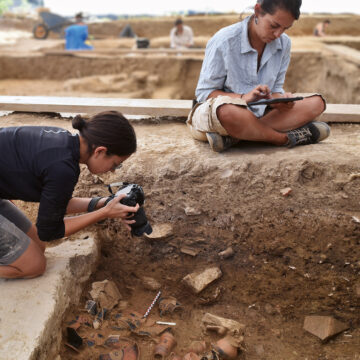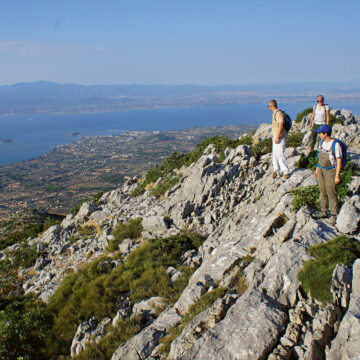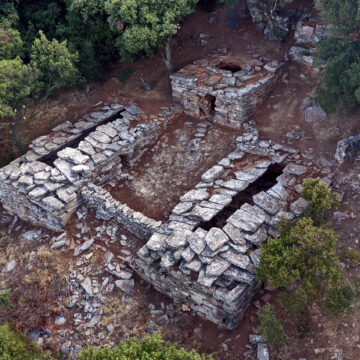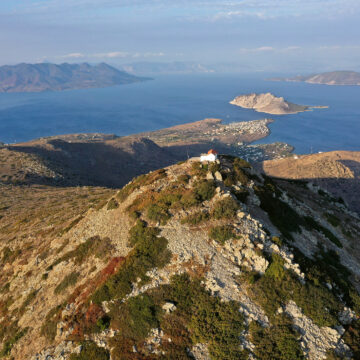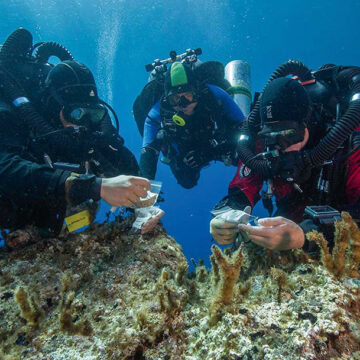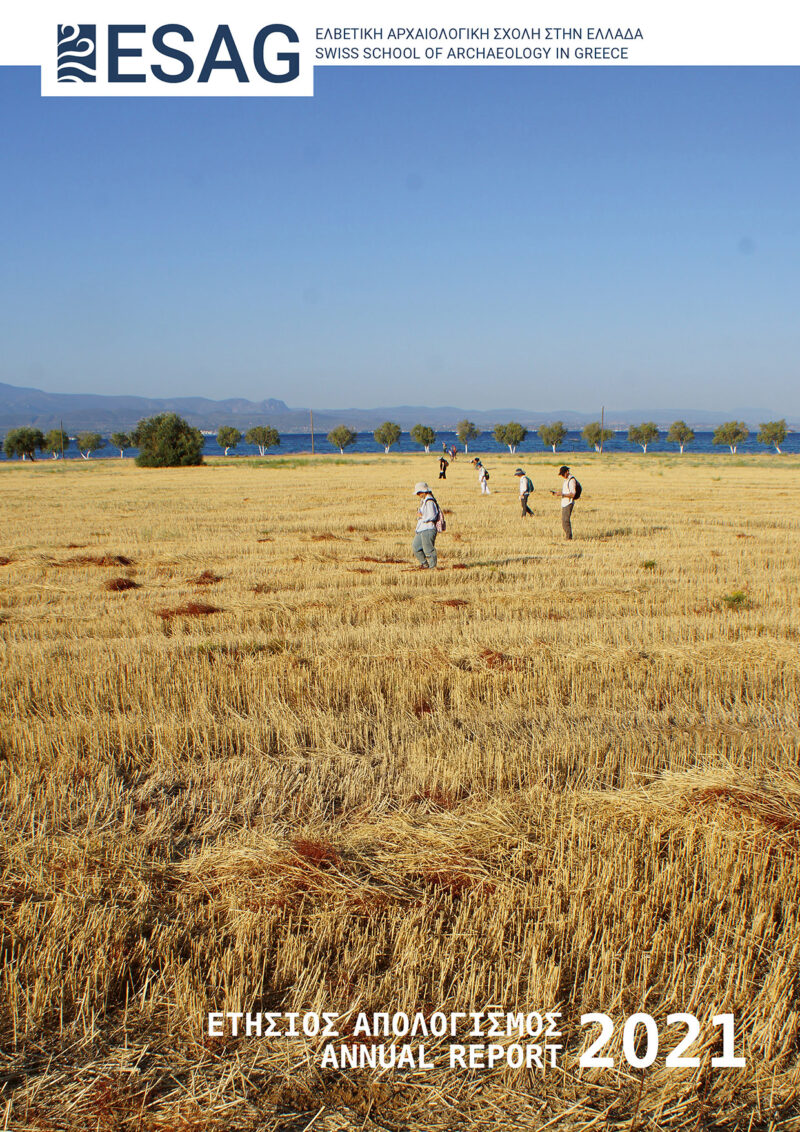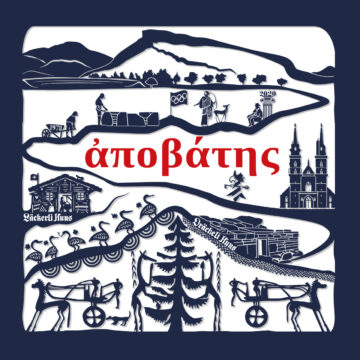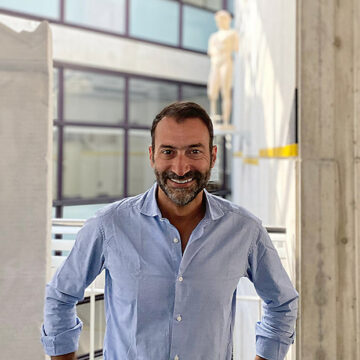Annual Report 2021
Fieldwork
Despite the Covid-19 pandemic and the tragic fires that ravaged Greece and Euboea in particular, the year 2021 was driven by the will to return to normality, especially with respect to fieldwork. The Swiss School of Archaeology successfully carried out excavations and surveys at Amarynthos and Ilkizes in Euboea as well as on Mount Oros on Aegina and off the island of Antikythera.
At Amarynthos, the 2021 excavation season contributed to clarifying the plan and phases of the temple of Artemis. The late Archaic offering deposit discovered in 2020 was almost completely excavated. Exceptionally rich and well preserved, this deposit is one of the most spectacular discoveries made in Greece in recent years and has been widely reported in the Greek and worldwide media.
The excavation of the Artemision has been extended by a survey project starting this year, which aims at clarifying the sanctuary’s position within the ancient landscape. Despite the intensive urbanisation of the region, more than 300 plots of land, spread over an area of 12 km2, were surveyed to the east of Eretria. Several ancient settlements, burial plots as well as evidence of the sacred road connecting Eretria to the Artemision were located and documented.
The exploration of the so-called Drakospita or “dragon houses”, a particular type of dry-stone rural buildings located in the mountain range of Southern Euboea, continued this summer. The excavation of the Drakospito at Ilkizes provided evidence for both its dating and function. Other Drakospita, namely at the site of Palli-Lakka and the near vicinity, were cleaned and surveyed, in order to improve our understanding of these enigmatic buildings.
Outside Euboea, the School’s fieldwork was enriched in 2021 by two new projects. On the island of Aegina, an excavation and survey project in collaboration with the Ephorate of Piraeus and Islands aims to systematically document the Bronze and Early Iron Age remains discovered on the summit of Mount Oros, where the sanctuary of Zeus Hellanios is located.
The second project is a continuation of the investigation of the famous shipwreck off the island of Antikythera. Based on a systematic reapparaisal of the documentation, the aim of this project is to better understand the event of the wreckage and the dispersion of its cargo, as a prelude to new investigations on the site. A preparatory expedition took place in October 2021, with a team of divers surveying around the shipwreck.
These fieldwork activities, together with other research projects carried out by ESAG members, reflect the dynamism of Swiss archaeology in Greece, as the country celebrates the bicentenary of the War of Independence
ἀποβάτης – Collection of Essays in Honor of Karl Reber
Edited by Guy Ackermann – Tobias Krapf – Laureline Pop
Karl Reber has been exploring the rich cultural heritage of the Greek island of Euboea for more than forty years. He was director of the Swiss School of Archaeology in Greece from 2007 to 2021 and conducted several excavations in Eretria and Amarynthos. On the occasion of his 65th birthday and his retirement after fifteen years as a Professor at the University of Lausanne, his former students dedicate a collection of essays to him, entitled ἀποβάτης. The twenty-three contributions are devoted to ancient finds, recent discoveries and new ideas on the ancient city of Eretria, the nearby sanctuary of Artemis Amarysia and the Euboean countryside from the Mycenaean to the Imperial period.
ἀποβάτης onlinePersonalia
Since 1 July 2021, I have the honour and privilege of assuming the position of Director of the Swiss School of Archaeology in Greece. I would like to take this opportunity to sincerely thank my predecessor, Karl Reber, for his commitment and generosity.
Another major change is that Valentina Di Napoli, the School’s Administrative Secretary since 2002, has taken up a Professorship at the University of Patras. I would like to warmly congratulate her on this appointment and express our gratitude for her work, which significantly contributed to the professionalisation of the School’s administration in Greece. Valentina has been replaced by Daphne Vlanti, who holds a PhD in Classical Archaeology from the University of Oxford.
I would also like to welcome a new collaborator, Sylvie Fournier, who is now in charge of the School’s communication, and also thank Tamara Saggini, who acted as interim Scientific Secretary in Greece from 1.12.2020 to 30.6.2021, during the leave of absence of Tobias Krapf.
Finally, I would like to thank the members of the School’s Board of Trustees for their dedication, as well as the University of Lausanne, with which the ESAG has just signed a new collaboration agreement.
Acknowledgments
Directorate of Antiquities in the Greek Ministry of Culture and Sports, Πολυξένη Αδαμ-Βελένη (Γενική Διευθύντρια)
Department of Foreign Schools, Κωνσταντίνα Μπενίση (Προϊσταμένη), Σοφία Σπυροπούλου
Ephorate of Antiquities of Euboea, Αγγελική Σίμωσι (Προϊσταμένη), Κώστας Μπουκάρας, Όλγα Κυριαζή, Φανή Σταυρουλάκη, Σταυρούλα Παρίσση
Embassy of Switzerland in Greece, Α.Ε. Olaf Kjelsen
Embassy of Greece in Switzerland, ΑΕ. Αικατερίνη Ξαγοράρη
Municipality of Eretria, Ιωάννης Δημητρόπουλος
Cultural Association of Amarynthos, Αντώνιος Καραβάς
Gerani Association, Κώστας Φραγκουλόπουλος
Swiss National Science Foundation
Federal Department of Economic Affairs, Education and Research
State Secretariat for Education, Research and Innovation
University of Lausanne and other universities in Switzerland
Sandoz Family Philanthropy Foundation
Stavros Niarchos Foundation
Théodore Lagonico Foundation
Afenduli Foundation
Isaac Dreyfus-Bernheim Foundation
Société académique vaudoise
